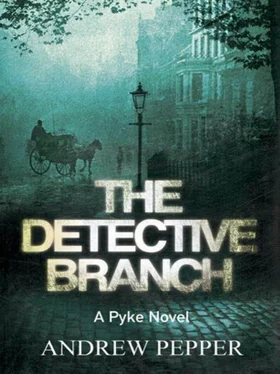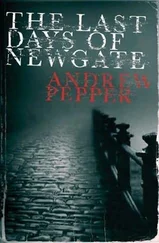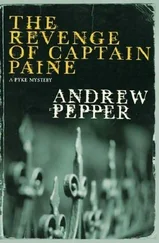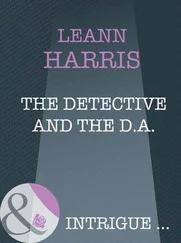Andrew Pepper - The Detective Branch
Здесь есть возможность читать онлайн «Andrew Pepper - The Detective Branch» весь текст электронной книги совершенно бесплатно (целиком полную версию без сокращений). В некоторых случаях можно слушать аудио, скачать через торрент в формате fb2 и присутствует краткое содержание. Жанр: Исторический детектив, на английском языке. Описание произведения, (предисловие) а так же отзывы посетителей доступны на портале библиотеки ЛибКат.
- Название:The Detective Branch
- Автор:
- Жанр:
- Год:неизвестен
- ISBN:нет данных
- Рейтинг книги:3 / 5. Голосов: 1
-
Избранное:Добавить в избранное
- Отзывы:
-
Ваша оценка:
- 60
- 1
- 2
- 3
- 4
- 5
The Detective Branch: краткое содержание, описание и аннотация
Предлагаем к чтению аннотацию, описание, краткое содержание или предисловие (зависит от того, что написал сам автор книги «The Detective Branch»). Если вы не нашли необходимую информацию о книге — напишите в комментариях, мы постараемся отыскать её.
The Detective Branch — читать онлайн бесплатно полную книгу (весь текст) целиком
Ниже представлен текст книги, разбитый по страницам. Система сохранения места последней прочитанной страницы, позволяет с удобством читать онлайн бесплатно книгу «The Detective Branch», без необходимости каждый раз заново искать на чём Вы остановились. Поставьте закладку, и сможете в любой момент перейти на страницу, на которой закончили чтение.
Интервал:
Закладка:
A stout, middle-aged woman wearing a cotton dress and a woollen shawl opened the door. Pyke introduced himself as a police detective and explained that an anonymous note had been passed to him bearing a few lines of poetry and that address.
‘So?’
‘I’m just trying to determine why someone might have sent the note.’
Still blocking his path into the building, the woman looked at him and sighed. ‘When you told me you were a policeman, I assumed you were here to rake over what happened in the summer.’
Pyke looked past her into the entrance hall. ‘And what exactly did happen in the summer?’
Crestfallen, the women lowered her voice and said, ‘A young child died. Poor mite fell to his death. It was said that one of the lodgers who resided on the top floor deliberately dropped him over the banisters. There was a trial and the man was found guilty. I don’t know any more about it than that.’
‘Who lives up there now?’
‘No one, as far as I know.’ The woman looked at him and sniffed. ‘No one’s lived there since it happened.’
Pyke found out which room the woman rented — her name was Mrs Morris — and told her that he’d like to talk to her further, after he’d taken a look upstairs. The air in the hallway smelled of stale food and mildew and paper was peeling and flaking from the soot-blackened walls. He ascended the creaking staircase two steps at a time and paused for a moment on the first-floor landing. The building was absolutely quiet. Perhaps, he surmised, the residents were all working. The stairs leading up to the top floor were a little wider and, as he mounted them, Pyke wondered whether this was where the child had fallen — or been dropped. He did remember reading about the incident and the subsequent trial but that was all. On the landing there were three doors, all closed but none of them locked. Pushing the first one open, he waited on the threshold and called out, ‘Hello?’ No one answered. Light flooded in through two large windows and there were some pieces of old furniture but otherwise the room was deserted. The other two rooms were also empty. It was just as the woman had said: no one had lived up here for months.
Having got the name and address of the landlord from Mrs Morris, Pyke stood outside on the pavement and looked up at the building. Who had sent him the note and what were the few lines of poetry meant to suggest?
Jabez Sylvester ran his practice from the ground floor of a building in nearby West Street. After a brief conversation with one of the clerks, Pyke was shown into the lawyer’s office, where Sylvester was sitting at his desk reading, a selection of leather-bound volumes lining the bookcase behind him. He was sixtyish, and had grown plump on his modest success. He dressed like a gentleman and greeted Pyke with little enthusiasm. With some cajoling Pyke finally managed to elicit the full story of what had happened at No. 28 and later that afternoon he was able to corroborate the lawyer’s account with the official record of the trial.
Brendan Malloy, a former Catholic priest from the west of Ireland, had been the main witness for the prosecution, alleging that on the tenth of June a man called Ebenezer Druitt, who also lodged in one of the upstairs rooms at No. 28, had deliberately and with malice aforethought dropped a ten-month-old child down the stairs to his death. During the trial, Malloy had alleged that Druitt had committed this ‘vile, wicked act’ out of jealousy over his own attachment to the infant’s mother, Sarah Scott, also a resident in the building. Druitt had pleaded not guilty to the charges and during cross-examination had sought to paint the former Catholic priest as a Devil worshipper and a man who’d been forced to leave the Church as a result of perverse sexual desires. In the end, the judge, Mr Justice Parks, had ruled that ‘intent to kill’ had not been proven and the charge was reduced from murder to manslaughter. After an hour of deliberation, the jury had found Druitt guilty of ‘fatally mishandling’ the infant and the judge had sentenced him to five years’ imprisonment in Pentonville. During his summing up, the judge had remarked on Druitt’s sneering indifference to the fate of the child and to the suffering of the mother, Sarah Scott, who hadn’t been called as a witness.
‘Do you think this man, Druitt, intended to kill the infant or not?’
Sylvester rubbed his chin and frowned. ‘I have no opinion on the matter. The jury made its decision and I see no reason to question the verdict.’
‘Do you know what became of Malloy and Sarah Scott?’
‘I don’t know about the woman,’ Sylvester said, relaxing into his chair. ‘Malloy, I’m afraid, fell into the bottom of a whisky glass. You can find him most days in the Black Lion on Berwick Street. Either there or the Crown and Anchor on Broad Street.’
‘He moved out of your property shortly after the incident?’
‘They all did.’
‘Then why haven’t you rented out the rooms? Surely as long as the rooms remain empty, you’re losing money.’
‘I’ve tried, believe me.’ The lawyer gave him a baleful stare. ‘But folk around here are superstitious and they have long memories. No one wants to move into a place where a young child was killed.’
Pyke nodded. ‘What kind of tenants were they?’
Sylvester shrugged. ‘They paid their rent on time.’
‘What did the other tenants think of them?’ Pyke asked, sensing some reticence.
Sylvester rubbed his chin again. ‘The one who was the priest was quite well liked.’
‘But not Druitt?’
‘No, I don’t think the neighbours much cared for him. I’m told he brought a lot of people into the building. Footsteps on the stairs all hours of the day and night.’
‘What did you think of him?’
‘He was the first one who came to me, wanting to know whether he could rent any of the rooms. Apparently the poet, William Blake, was born in No. 28, and Druitt admitted to being a great admirer of Blake’s work. To be honest, I always found him rather charming.’
Pyke silently admonished himself. He knew Blake’s poetry quite well and should have recognised the lines. His realisation didn’t explain why someone had sent him the quotation but it gave him somewhere to start.
Later, after Pyke had arrived home and eaten his supper, he went upstairs to check on Felix and his uncle, who was awake and sitting up in his bed. In the past few days he’d seemed a good bit better and had some colour in his cheeks. When Pyke quoted the lines of the Blake poem, Godfrey smiled. ‘Blake’s The Marriage of Heaven and Hell, if I’m not much mistaken.’
‘I didn’t recognise it. But you knew it straight away.’ Pyke handed Godfrey the note he’d been sent. ‘I presume it’s well known?’
‘Are you questioning my literary knowledge, dear boy?’
That made Pyke smile. It lifted him to see his uncle in better spirits.
‘It’s an illustrated edition: Blake’s great paean to Milton.’ Then by way of explanation, Godfrey continued, ‘Blake wanted to humanise the Devil, just as Milton had done in Paradise Lost. Turn him into a figure of justified rebellion. Blake described Milton as “a true poet of the Devil’s party without knowing it”.’ Godfrey was sitting upright and his white hair had been combed back off his face. He looked better than he had done in a long while, Pyke thought, although he was still desperately thin.
‘So what do those lines mean? Why does the sneaking serpent walk in mild humility?’
‘The snake’s always been understood as Satan in another form.’ Godfrey looked down at the piece of paper. His hands were frail and bony and the paper shook as he studied the contents. ‘You see here the snake walks in mild humility. How many snakes do you know that can walk? But I’d say the emphasis is on the just man who’s raging in the wilds.’
Читать дальшеИнтервал:
Закладка:
Похожие книги на «The Detective Branch»
Представляем Вашему вниманию похожие книги на «The Detective Branch» списком для выбора. Мы отобрали схожую по названию и смыслу литературу в надежде предоставить читателям больше вариантов отыскать новые, интересные, ещё непрочитанные произведения.
Обсуждение, отзывы о книге «The Detective Branch» и просто собственные мнения читателей. Оставьте ваши комментарии, напишите, что Вы думаете о произведении, его смысле или главных героях. Укажите что конкретно понравилось, а что нет, и почему Вы так считаете.












